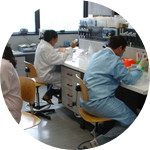About This Project
In order to fight breast cancer, scientists must gain a deep understanding of the interaction between the cancer stem cells (CSCs) and their surrounding tumor microenvironment (TME).Today, CSC -TME interaction is still unclear. This project will develop a platform for studying CSC and TME cell interaction in vitro, in order to define correct strategies to modulate tumor progression.Ask the Scientists
Join The DiscussionWhat is the context of this research?
Our goal is to recreate in vitro on a microscale the complexity of the tumour microenvironment (TME), in order to study in-depth the molecular events which determine the intercellular crosstalk modulating cancer cell behaviour.
We will take advantage of a microfluidic multiparametric platform recently developed which enables to dissect cell type specific contribution in complex intercellular scenarios by morphological, biochemical molecular and functional assays.
Breast cancer cells will be cultured either independently or in microfluidic communication with different cells known to play a role in the characterization of the tumour microenvironment
TME cells and CSCs , either in normoxic or hypoxic conditions, will be subjected to diverse inflammatory challenges and parameters known to play a role in tumor growth such as cytokine secretion and cell migration will be monitored.
Subsequently, the complex biological system will be recreated by connecting on microfluidic systems the different cell populations and evaluating the modulating effect of different
What is the significance of this project?
The aim of this project
is to identify key parameters to correlate with breast cancer progression and to identify candidate molecules which positively modulate the anti-inflammatory action, such as key genes activated or main biochemical pathways involved.
Once the microfluidic platform for targeting TME-CSCs interaction will be validated and main, well-established biochemical, functional parameters analyzed, the platform will represent a valuable tool for testing novel drugs aimed at stopping CSCs-mediated tumor progression through a selective characterization of cell-specific response to drug exposure within a complex in vitro, physiologically-relevant pathological context
What are the goals of the project?
The goals of this project are:
1. Set up of the microfluidic platform for studying TME-CSC interaction
2. In vitro recreation of pathological scenarios TME-CSC
3. Dissection of intercellular crosstalk mechanisms
4. Identification of selected key targets involved in tumor progression which are affected by the TME.
Budget
All budget will be allocated to pay for reagents, cell culturing media, antibodies, and plasticware necessary to culture cells in vitro and run the biochemical, molecular and functional analysis.
Examples of assays to be run include:
ELISA for biochemical evaluation of cytokines being produced
Confocal microscopy for morphological observation
Quantitative PCR for evaluation of selected gene expression
Kits for Oxidative stress analysis
Kits for Vitality and proliferation tests
Meet the Team
Team Bio
Fabio Bianco received a degree in Medical Biotechnology and a PhD inPharmacology from the University of Milano. His research activity has been focused on the study of intercellular communication among cells, in physiological and pathological conditions. In particular, results from his studies revealed the existence of a novel alternative mechanism of communication inside the Central Nervous System ,based on the release of microvesicles, responsible for the onset of neuroinflammatory events leading to neurodegeneration. In 2007, he co-founded Neuro-Zone srl, a biotech focused on high content multiparametric cell assays.
In 2007 he was awarded the Lombardy Region’s INGENIO outstanding entrepreneurship prize. Dr. Bianco has become Scientific Reviewer Board Member of the Merck Manual of Health. He is also member of Life Science Professionals, and Advisory Board Member of Webmed Central.
Lab Notes
Nothing posted yet.
Additional Information
Strength:The project relies on a proven track of scientific expertise led by Dr. Bianco on cell signaling and functional characterization of inflammatory contexts (as an example: Bianco et al., Brain Res. Rev. 2005, Bianco et al. J Neurochem 2006, Bianco et al. J Immunol 2005, Bianco et al., EMBO J 2009, Bianco et al., Purinergic Signal 2009, Bianco et al. Analytical Chemistry 2012, etc..). Moreover, collaborators (Dr. Claudio Storini) involved in the project have carried out most of their research activity so far in fields related to evaluation of cellular behavior in metabolically challenged scenarios (ie. Storini et al Ann Neurol 2009, Capone et al Plos ONE 2007, Storini et al J Pharmacol & Exp. Therap. 2006, etc…). These strong expertise in all trasversal scientific, technical and operative aspects of the project presented guarantees the success of the experimental plan.
Weaknesses:
Pharmacology for studying cell signalling in inflammatory scenarios (i.e. purinergic signalling) is a growing field with continuous improvements in the development of appropriate tools such as antibodies of good quality, selected inhibitors etc.. Often times, a cocktail of inhibitors is required in order to isolate the functional response of a specific receptor.
Alternative plans:
If main planned experimental setting should result unsatisfactory, alternative experimental scenarios will be taken into consideration in order to obtain the same effect. For example, if a selected pharmacological inhibitor should result a partial one, thus impairing comprehension of the effect of selected receptor activation, alternative strategies such as siRNA will be taken into account.
Project Backers
- 4Backers
- 1%Funded
- $121Total Donations
- $30.25Average Donation
